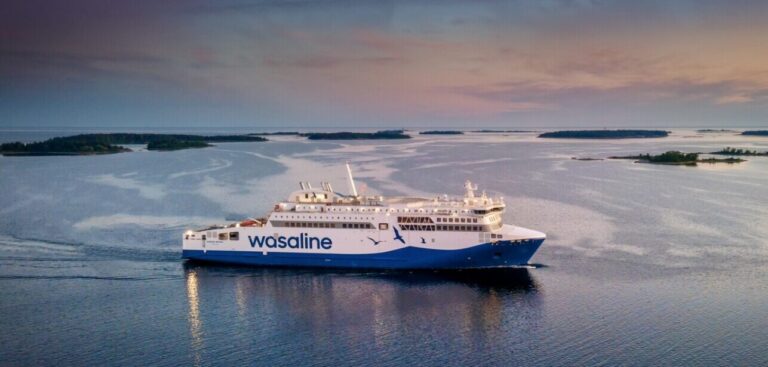Car and passenger ferry Aurora Botnia is nearing the end of construction at Rauma Marine Constructions’ (RMC) shipyard in Rauma, Finland. The vessel has recently successfully completed its first sea trial, where it was subjected to performance testing over three days under the supervision of RMC, representatives from Wasaline (the ship’s owner) and equipment manufacturers.
The vessel’s main engines operate primarily on low-emission liquefied natural gas, meaning sulfur, nitrogen and carbon dioxide emissions are all reduced. It will be possible for the ship to be powered by biogas in the future, and an onboard electric power system can be used when operating to and from ports.
Upon its completion, the Aurora Botnia will reportedly become the world’s most environmentally friendly passenger car ferry. During the performance tests, the ship’s propulsion system and equipment were optimized to be as efficient and economical as possible.
“We adjusted the powerplant and tested the ship’s speed, propulsion and steering, among other things, during the sea trials,” explained Johanna Kaijo, project manager for Aurora Botnia at Rauma Marine Constructions. “We ran the ship’s fuel-efficient main engines with different settings and fine-tuned the automation to further improve the vessel’s environmental sustainability. In addition, we were able to ensure in practice that the ship’s design meets the strict criteria of the Clean Design class notation.”
The Aurora Botnia is said to be the first car and passenger ferry in the world to achieve a Clean Design class notation. This means that the design and build of the ship significantly exceed the requirements of the International Convention for the Prevention of Pollution from Ships (MARPOL).
“Our goal is to be a pioneer in environmentally sustainable technology in shipbuilding. Our ship for Wasaline is a prime example of what we can achieve by combining years of experience from building dozens of previous ships with the latest innovations. We are grateful to the customer for the opportunity to build such a great vessel,” said Jyrki Heinimaa, CEO and president of Rauma Marine Constructions.
The success of the sea trial is a major milestone in the shipbuilding process for both RMC and Wasaline before the vessel begins operation on a route between the Finnish city of Vaasa and the Swedish city of Umeå.
“This was definitely a highlight for us, a culmination of several years of effort,” commented Kaijo. “We were able to meet the expectations of our work, ensuring that the ship we built can operate as intended.”
“The event was important to Wasaline, too, as we had the opportunity to get to know our new ship and its operations in marine conditions for the first time with the project’s key personnel,” explained Peter Ståhlberg, managing director, Wasaline.
Plans are currently underway for the vessel to be handed over in Vaasa.



